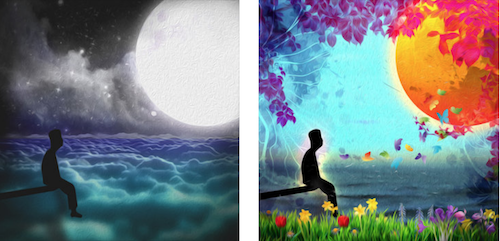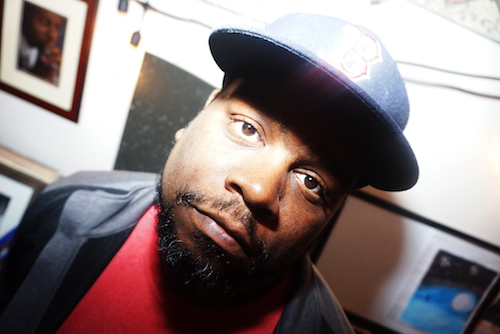Iron City’s Finest: Akil Pratt discusses evolution, emotion on double LP Depressed Genius

By Jakob Frazier
In a climate where easily digestible content and singles are highly rewarded, it’s becoming increasingly difficult to find artists who are coming up with new and captivating concepts and creating clever, thought-out albums instead of chasing that trendy sound.
It’s not impossible, however; Akil Pratt proves that on his new album Depressed Genius. The album is technically two albums: one Depressed and one Genius. The two are vastly different in terms of styles, sounds, and ideas, but they hold an astonishing amount of parallels (e.g. the opposite album covers; both of the opening tracks have Sun in the title; the second tracks are “Rise” and “Shine,” respectively). With one hefty album masquerading as two shorter projects, Akil Pratt covers a lot of ground on Depressed Genius. Akil was kind enough to talk with me about the creation of the album, his inspirations, and what he wishes for the album to convey.
Phrasure: Thanks for talking to me, Akil. First things first, how have you been? Obviously 2020 has been quite an experience for us all.
Akil Pratt: Hey, no problem man. I really appreciate it. I have been riding this rollercoaster out like most of us, but overall, I am thankful to still be able to work and do music. 2020 has definitely been one for the books. More remains to be seen though.
I have to say that I love the album. I know you previously worked with Shaun Judah (who appears on this album – we’ll talk about that later) on an album called Standing 8 Count. Is Depressed Genius your first solo album?
Thank you, bro. I am happy to hear someone express love for something that I put forth effort to create. That makes it all the more enjoyable. So, in terms of my rap career so-to-speak, this is actually like a rebranding for me of sorts. I was really heavy into the Christian Hip-Hop Scene years ago. I went by the name “Red Letters the Less,” and I have a few projects out on DSPs under that name, as well as a mixtape called Life and Affections. This was about from 2008-2012. I was in two groups before that. I have been producing music for about 20 years (laughs), but I’m still growing and evolving. So, technically, this is my third solo album, but first one under this stage name.
Gotcha. So, how long did this album take you to create, and how did it evolve from its inception?
OK. This is a layered question, but I will say that when you make art that imitates life, sometimes your art tends to ebb and flow along with said life, leaving ideas and concepts behind while birthing new ones. But concretely, from the first song I wrote for this album, to the last song I finished recording, was about 4-5 years. There was a lot of “dead space” in between that time as well, so there’s that. I reached out to Shaun Judah to work on a project, and after getting that one out, I got the motivation/confidence to go ahead and finish Depressed Genius.
I understand that. What was the inspiration for the concept of the album, the double disc decision, and the different sounds for each disc?
I’m kinda angry, because I don’t remember the “aha moment” at which I coined the album title (laughs). But I can tell you that the concept came from pure emotions that I was feeling about myself, my circumstances at the time, and my overall health. The Depressed Genius concept was birthed from the question of, “I have all this talent. I have the resources. I have what appears to be freedom to do whatever I want to do, and take this … life … as far as I want to take it. What’s holding me back? What is the issue here?” Those are the ideas addressed on the depressed version of the album.
Initially, I thought to mingle in a few “positive” songs on the album and make it one album – wait, let me say this as well: I LOVE good, well thought out albums. I like an album that flows effortlessly. It’s not an easy thing to achieve, but I feel like that is one of the things that I am really good at. So I started to see that trying to put a positive song or two in the middle of the depressed version of the album, messed up the flow of it, and that is how the double album concept was realized. I decided I could give the same amount of positive energy in an album that I did addressing all the negative. So that’s what I did. Everything from the contrasting sounds, to the “no rap features” on the depressed version, while a crap-ton of rap features on the genius version, to the dark, sobering beats and rhymes on depressed side and more bright and melodic feels on the genius side, was all planned.

Brilliant. And it worked out well. Also, I definitely noticed that you were the only rapper on the depressed version. Sidenote, do you have any favorite double disc albums? Did they inspire Depressed Genius at all?
The first double disc album that I remember was Tupac’s All Eyez on Me. I don’t remember a lot of other albums that were released as double discs. Sidenote to your sidenote, another reason I did it because I did not want to make a long album. In our listening culture, attention spans are shorter. It was kind of like a mind thing to give the audience two separate albums around 30 minutes each. The flow of the albums makes them seem much shorter as well, in my opinion.
I agree with that. Now, I imagine during this time you were also producing and engineering G.I. MAGUS’s excellent album, Verses the World. How did you manage working on both of those albums at the same time, and how was the process for them different or similar?
Actually, me and G.I. really worked hard on that project, so during that time I was dialed in on making sure we put out the best project [for him] that we could. I think I was still conceptualizing things in my head for Depressed Genius during that time. I had beats and rhymes here and there, but things didn’t seriously pick up steam until after we finished VTW. The processes were very similar. VTW had an evolution like you wouldn’t believe. We were really surprised at some points at how good some of the songs turned out from where they started. I can say the same for DG. You start with a concept, but then you add a musician here, a feature there, and things really round out to a pleasurable product.
Oh, for sure. So we’ve mentioned Shaun Judah and G.I., but you also pulled some other Birmingham heavy-hitters like OZU, K1NG ELJAY, Dean Priest …. How did you go about picking features, and why did you pick them?
Most of the people I had featured on the album were people that I already had some type of relationship with. Shout to Equiknocks and Joe Clark as well. Them’s the bros (laughs). Me and K1NG ELJAY’s relationship is continuing to evolve into a pretty good one (hint hint;). OZU was just a shot in the dark, to be honest with you. We had met in the past, but I wasn’t sure when reaching out to him, if he would agree. He did, and the song turned out great. I am a fan of all of my features. Dean actually wrote the hook to “Picture This” early on. In other cases, there are certain songs that you can ‘hear’ a person on, or you would just wanna see what it would sound like at the very least. I’m glad everything ended up sounding amazing. Thanks to those guys.
Very nice. You touch on some pretty heavy topics over the course of the album. Were there any songs that were particularly difficult to write?
The way I write music is solely based off of feeling almost ALL of the time. I get the “feeling timestamp” before I put pen to paper. Sometimes hearing the beat helps, but once I can encapsulate the feeling, the song is as good as written. The HARDEST song for me to write was, “Generations.” In fact, I wrote the song one time, then lost the notebook that I had written it in and had to write it AGAIN (laughs).
Aw man, I’ve been there before. That’s tough.
Both times were difficult, because those feelings were the hardest to articulate for me, for some reason. Every song written on the project, no matter how heavy or jovial, came from actual feelings that I experienced at some point in the recent past. I was glad to get all of that out of me though.
I relate to that. Finally, what experience do you want the listeners to take away from Depressed Genius?
I want my listeners to know that they CAN weather life’s storms. I want them to embrace what makes them a genius in their own right and thrive there. I want them to know that there are people who share in a lot of the things that pain you, and that cause you to want to give up, and that you can be honest about those things. Like I said at the end of the project, there is a lot more that I want to and will say about some of these things, but for now I will leave it here.
Sounds good to me, man. Well, thank you so much for chatting with me.
Thank you so much for the interview. Peace.
Depressed Genius can be purchased at akilpratt.bandcamp.com or streamed on all digital streaming platforms. Follow Akil Pratt on Instagram and Twitter @akilpratt.
Jakob Frazier, aka Phrasure, a rapper who sometimes writes words that don’t rhyme. He’s committed to spreading word about some of the best MCs from Birmingham, Ala. He can be found on Facebook and Instagram.

Exceptional albums and great interview!!